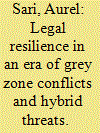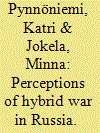|
|
|
Sort Order |
|
|
|
Items / Page
|
|
|
|
|
|
|
| Srl | Item |
| 1 |
ID:
179098


|
|
|
|
|
| Summary/Abstract |
The international system has entered a period of increased competition, accompanied by a steady retreat from multilateralism and international institutions. The purpose of this article is to place these developments within the context of three concepts that have risen to prominence in recent years: lawfare, hybrid warfare and grey zone conflicts. In doing so, the article makes three arguments. The instrumental use of international law for strategic purposes forms an integral feature of the international system. Although the notions of lawfare, hybrid warfare and grey zone conflict all contribute towards a better understanding of the instrumentalization of international law, neither offers a complete framework for analysis and for developing an appropriate policy response. The challenges posed by the instrumentalization of international law are therefore best countered by adopting a legal resilience perspective and by fostering an operational mindset.
|
|
|
|
|
|
|
|
|
|
|
|
|
|
|
|
| 2 |
ID:
179100


|
|
|
|
|
| Summary/Abstract |
Joseph F. Fletcher, Jr. (1934–1984) was a historian of China and Central Asia1, but not just a historian of China and Central Asia: he was also a scholar of Asia broadly understood, writing on topics ranging from Islamic Inner Asia to the Turco-Mongolian tradition in the Ottoman Empire. When the Historical IR (HIST) Section of the International Studies Association decided to institute an annual prize for edited volumes, I – as the chair of the section2 – suggested that we name3 the prize after Joseph F. Fletcher, for two reasons. First, perhaps because he died relatively young, most of Fletcher’s output is found in edited volumes. Second, and more importantly, even while he is writing about a specific region, Fletcher’s writing sparkles with a comparative perspective, unearthing unexpected similarities and connections. This is unusual, especially in a historian of his generation. You could say that Fletcher was doing global history (or even global IR) before it became a ‘thing.’ The combination of these two factors made Fletcher the ideal historian to name our prize after, not the least because the HIST section advocates not only for historical scholarship but for historical IR scholarship that has a global comparative and international outlook as its starting point.
|
|
|
|
|
|
|
|
|
|
|
|
|
|
|
|
| 3 |
ID:
179097


|
|
|
|
|
| Summary/Abstract |
In this article, we analyse what hybrid war entails in the context of Russian military periodicals. Two dominant interpretations emerge from the debate. Hybrid war involves a conflict between civilizations and a geopolitical struggle for power. In both cases, the West is represented as an active participant in the conflict, intent upon undermining Russia’s geopolitical status, cultural code and political system. The debate emulates Russian official rhetoric about national security threats and thus consolidates official interpretations, rather than offers alternatives to them. Russian analysts have also engaged in more abstract theoretical analysis in which hybrid terminology is rarely used or is approached critically. Further research is required to assess the ways in which this debate has been used in shaping public perceptions of threats towards Russia.
|
|
|
|
|
|
|
|
|
|
|
|
|
|
|
|
| 4 |
ID:
179099


|
|
|
|
|
| Summary/Abstract |
This article presents a typology of armed non-state actors in hybrid warfare: proxy, auxiliary, surrogate and affiliated forces. By focusing on the kinetic domain of hybrid warfare, the article offers a corrective to a debate that has so far ignored variation in roles and functions of non-state actors and their relationships with states and their regular forces. As a denominator, ‘hybrid’ identifies a combination of battlespaces, types of operations—military or non-kinetic—and a blurring of actors with the scope of achieving strategic objectives by creating exploitable ambiguity. However, there has been a disproportionate focus on what hybrid war supposedly combines across battlespaces and domains (socio-political, economic, informational), at the expense of who and how. Using the Ukrainian crisis as a theory-building exercise, the article suggests a four-category schema that identifies non-state actor functions as a tool to better represent the complex franchise of violence that is found nested next to non-military operations in hybrid activity. In so doing, the article speaks to a call for better conceptualization the role of non-state violent actors in civil war, in general, and in hybrid warfare, in particular.
|
|
|
|
|
|
|
|
|
|
|
|
|
|
|
|
| 5 |
ID:
179096


|
|
|
|
|
| Summary/Abstract |
As the introduction to the special section on hybrid warfare, this paper establishes the contours of the contemporary debate about the topic, outlines the arguments made by the three papers that follow, and locates hybrid warfare in the broader realm of strategic thought. Enhancing the conceptual basis that hybrid war is grounded in allows us to understand the broader strategic implications of ambiguous uses of force. Collectively, the papers in this section offer fresh insight into non-Western perspectives of the concept, create original typologies for understanding the actors involved in its prosecution, and analyse the implications for international norms and institutions.
|
|
|
|
|
|
|
|
|
|
|
|
|
|
|
|
|
|
|
|
|